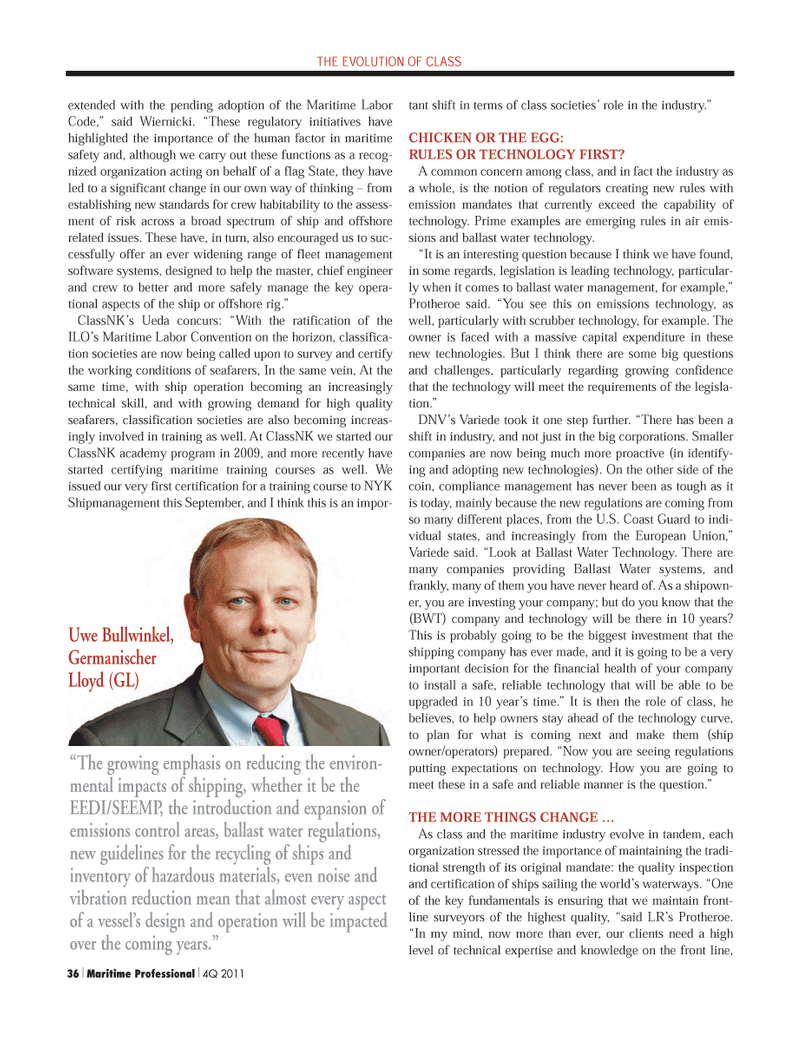
Page 36: of Maritime Logistics Professional Magazine (Q4 2011)
Classification
Read this page in Pdf, Flash or Html5 edition of Q4 2011 Maritime Logistics Professional Magazine
36 Maritime Professional 4Q 2011extended with the pending adoption of the Maritime Labor Code,? said Wiernicki. ?These regulatory initiatives have highlighted the importance of the human factor in maritime safety and, although we carry out these functions as a recog-nized organization acting on behalf of a flag State, they have led to a significant change in our own way of thinking ? from establishing new standards for crew habitability to the assess- ment of risk across a broad spectrum of ship and offshore related issues. These have, in turn, also encouraged us to suc- cessfully offer an ever widening range of fleet management software systems, designed to help the master, chief engineer and crew to better and more safely manage the key opera- tional aspects of the ship or offshore rig.? ClassNK?s Ueda concurs: ?With the ratification of the ILO?s Maritime Labor Convention on the horizon, classifica- tion societies are now being called upon to survey and certify the working conditions of seafarers, In the same vein, At the same time, with ship operation becoming an increasinglytechnical skill, and with growing demand for high quality seafarers, classification societies are also becoming increas- ingly involved in training as well. At ClassNK we started our ClassNK academy program in 2009, and more recently have started certifying maritime training courses as well. We issued our very first certification for a training course to NYK Shipmanagement this September, and I think this is an impor- tant shift in terms of class societies? role in the industry.? CHICKEN OR THE EGG: RULES OR TECHNOLOGY FIRST? A common concern among class, and in fact the industry as a whole, is the notion of regulators creating new rules with emission mandates that currently exceed the capability of technology. Prime examples are emerging rules in air emis- sions and ballast water technology. ?It is an interesting question because I think we have found, in some regards, legislation is leading technology, particular- ly when it comes to ballast water management, for example,? Protheroe said. ?You see this on emissions technology, as well, particularly with scrubber technology, for example. The owner is faced with a massive capital expenditure in these new technologies. But I think there are some big questions and challenges, particularly regarding growing confidence that the technology will meet the requirements of the legisla- tion.? DNV?s Variede took it one step further. ?There has been a shift in industry, and not just in the big corporations. Smaller companies are now being much more proactive (in identify- ing and adopting new technologies). On the other side of the coin, compliance management has never been as tough as it is today, mainly because the new regulations are coming from so many different places, from the U.S. Coast Guard to indi- vidual states, and increasingly from the European Union,? Variede said. ?Look at Ballast Water Technology. There are many companies providing Ballast Water systems, and frankly, many of them you have never heard of. As a shipown- er, you are investing your company; but do you know that the (BWT) company and technology will be there in 10 years? This is probably going to be the biggest investment that the shipping company has ever made, and it is going to be a very important decision for the financial health of your company to install a safe, reliable technology that will be able to beupgraded in 10 year?s time.? It is then the role of class, he believes, to help owners stay ahead of the technology curve, to plan for what is coming next and make them (ship owner/operators) prepared. ?Now you are seeing regulations putting expectations on technology. How you are going to meet these in a safe and reliable manner is the question.? THE MORE THINGS CHANGE ? As class and the maritime industry evolve in tandem, each organization stressed the importance of maintaining the tradi-tional strength of its original mandate: the quality inspectionand certification of ships sailing the world?s waterways. ?One of the key fundamentals is ensuring that we maintain front- line surveyors of the highest quality, ?said LR?s Protheroe. ?In my mind, now more than ever, our clients need a high level of technical expertise and knowledge on the front line, THE EVOLUTION OF CLASS ?The growing emphasis on reducing the environ- mental impacts of shipping, whether it be theEEDI/SEEMP, the introduction and expansion of emissions control areas, ballast water regulations, new guidelines for the recycling of ships and inventory of hazardous materials, even noise and vibration reduction mean that almost every aspect of a vessel?s design and operation will be impacted over the coming years.? Uwe Bullwinkel, Germanischer Lloyd (GL) MP #4 (34-49):MP Layouts 11/8/2011 1:59 PM Page 36

 35
35

 37
37
